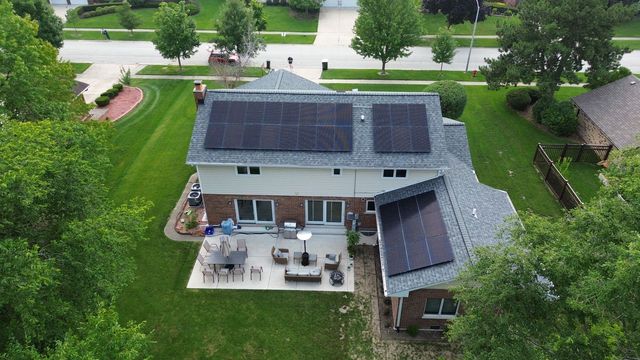Article at a Glance
- Average cost is $3.10 per watt, with total costs varying by location and energy needs.
- Sunlight exposure, tax incentives, and home size can lower overall costs.
- Cash, loans, leases, and PPAs offer different benefits based on ownership and budget.
- Federal and local programs, like the Residential Clean Energy Credit, provide up to 30% savings.
- Financing through home equity loans or lines of credit offers flexibility and potential interest savings
No one enjoys opening the mailbox to find a stack of bills inside. Imagine being able to significantly reduce or even eliminate one of them without making a major change to your lifestyle.
It’s possible when you invest in solar panels for your home. Harnessing the power of the sun to power your appliances can potentially reduce your monthly electricity expenses to zero, but for many homeowners, investing in solar energy is cost-prohibitive. However, it doesn’t have to be.
Keep reading to learn more about the best solar system financing deals and cost-saving options, from home equity financing to tax incentives.
Residential Solar System Financing Costs
How much do residential solar systems cost? It’s a fair question that many homeowners ask. The average cost per watt of power is $3.10, and given that homes use thousands of watts, you can expect your costs to hit four or five digits.
For instance, if your home needs six kilowatts of power to function effectively, you’ll have to pay $18,600. This cost can vary depending on where you call home; some states have average cost-per-watt rates lower than $3.10.
What Affects Solar Panel Costs?
Now that you understand how much solar panels cost, you should know specific factors that can impact how much you’ll pay.
Do you live in a sunny climate? If so, you’ll reap massive savings that will quickly recoup your start-up costs.
Moreover, there are numerous government tax incentives that you can take advantage of to lower your costs. Some localities provide partial reimbursement for installation costs, while others might let you write off your fees on your taxes. It depends on where you live.
Homeowners living in larger homes often pay more for solar panels, which makes sense; the more energy you need, the more you’ll have to pay.
Additional Read: Supercharge Your Property’s Worth with Solar Panel Investment
Solar Financing Options
There are many solar financing options available for you to choose from. While solar companies‘ financing offerings vary from company to company, you can expect the following options.
Cash
Pay upfront for your solar system in full if you have cash to spare. You’ll have immediate ownership of your solar panel system. Best of all, you can take full advantage of tax incentives immediately. Your credit score will soar, and you won’t worry about interest rates anytime soon.
But cash payment is only for some. While we recommend cash payment for homeowners planning to live in their houses long-term, you’ll lose money if you move out soon. So consider alternatives if a move is on the agenda.
Solar Panel Loans
One of the best benefits of solar system financing is flexibility. Need to be interested in an upfront cash payment? No problem; simply take out a solar panel loan.
When you get a solar panel loan, you’ll establish terms and conditions with a provider and then pay monthly installments with interest. While it’ll take time to repay your loan fully, you’ll have power as soon as possible.
You still own your panels like a cash payment, so you can immediately use tax credits and incentives. But, you must furnish any maintenance costs, as your loan won’t cover repairs and cleaning services.
Solar Panel Leases
Solar leases are an excellent choice for homeowners interested in renting solar panels. You’ll sign a contract with a provider instead of paying upfront or with a loan. Much like any other rental lease, you will pay fixed monthly fees.
How long would your lease last? Typically, homeowners sign contracts that last anywhere between 20 to 25 years. Your provider will handle maintenance and repair costs during that time, no questions asked.
We recommend solar panel leases for folks who don’t want to own solar panels but still want to reap their benefits. That said, there is a catch: you can’t use tax incentives or rebates with solar panel leases. And if you’re planning on moving anytime soon, you’ll have to either convince buyers to pay the lease or continue to pay it yourself.
Power Purchase Agreements (PPAs)
If you’ve previously considered the benefits of solar system financing, you might have encountered a strange phrase: power purchase agreements. Power purchase agreements, or PPAs, are simply a different type of solar lease. These leases lack a fixed rate, so your rates might vary.
PPAs will cost less than what you’d be paying for electricity. Unfortunately, while PPAs have a low monthly rate, this rate can increase over time; even worse, you won’t get access to solar rebates and incentives. You also won’t have to cover maintenance or repair costs.
You’re paying for energy use, not the solar panel system. While this might appeal to some homeowners, exercise caution and research before signing a contract.
Cash-Out Refinance
You can use part of your home’s equity to finance solar panel installation. This is one of the benefits of solar system financing that many homeowners must be aware of.
You can use your mortgage provider to cover part or all of your solar panel installation costs. Some homeowners choose HELOC plans or home equity lines of credit. So, if you sign onto a HELOC contract, you can leverage your mortgage much like a credit card with nominal interest rates to boot.
Cash-out refinance plans take time, and some mortgage providers might need to offer them. But it always helps to check with your provider.
Finding Solar Panel Financing Options
Homeowners can access various sources when they need solar system financing, from private solar loans from contractors and home equity financing to government programs that offer lower-interest-rate solar installation options and support.
Learn more about HOME SOLAR Cost & Savings
Tax Incentives and Credits
The federal government introduced the Residential Clean Energy Credit in 2022 as part of the Inflation Reduction Act. Homeowners can receive a credit of up to 30% of the cost of their solar system and installation on their federal income taxes. This can represent thousands of dollars in savings and significantly reduce your tax bill.
Some local and state governments offer additional incentives to encourage homeowners to switch to renewable energy. These may include a reduction in property taxes or access to a low-interest solar loan for qualifying applicants.
Another option is the Property Assessed Clean Energy program. PACE is available in some states and cities and offers low-cost funding that you can repay through your property taxes for up to 20 years. Not all mortgage lenders allow homeowners to participate in PACE, and it will increase your property taxes, but it’s an option to explore if other sources don’t work out.
Utilizing Home Equity for Solar Financing
If a cash purchase of solar panels isn’t practical, you can use the value of your home to access the funds that provide finance for solar panels.
You have two primary options for borrowing against your home equity: a home equity loan and a home equity line of credit.
A home equity loan allows you to take out a loan for up to a specific percentage of your equity, usually 85%. You receive the funds in a lump sum and make monthly payments on the balance. Because your home serves as collateral, you may get a lower interest rate, and the loan interest may be tax deductible.
A home equity line of credit is a revolving line of credit you can draw upon when you need cash. A HELOC is a flexible way to finance home improvements, but the interest rate can fluctuate over time. Most homeowners make interest-only payments on their HELOC until the repayment phase begins, and you must make a single balloon payment or additional monthly payments.
Solar System Loan Options
If you don’t want to tie your solar system financing to your home, you can access solar system loans from other sources, including:
- Solar contractors
- Personal or bank loans
- Government loan programs to help pay for home improvements
Each of these options has its pros and cons. Bank loans, for example, allow you to spend the cash however you wish but may have higher interest rates. Government programs may have lower interest rates, but you must meet specific qualifications.
Solar Leasing and Power Purchase Agreements
As the price of solar panels drops, solar lease and power purchasing agreements are becoming less common, but they can still be good options for homeowners who cannot or don’t want to make a cash purchase or take out a solar loan.
With a solar lease, the solar company retains ownership of the equipment they install on your home, and you pay a monthly fee to use it. A PPA is similar, except instead of paying for the equipment and paying the local utility company, you pay for the amount of electricity the panels produce.
While these are affordable options to bring solar energy into your home, they don’t offer the tax benefits of a purchase. You won’t see as much of a financial return because the panels don’t add home value.
Connect with RxSun to Get the Best Solar Financing Deals
If you want to upgrade your home with solar energy but have concerns about the cost, call RxSun at 800-607-9786 to schedule a consultation and learn more about affordable solar system financing options. From loans to tax credits, we can show you how to maximize your investment.
 800-607-9786
800-607-9786

 1-800-60-RXSUN
1-800-60-RXSUN